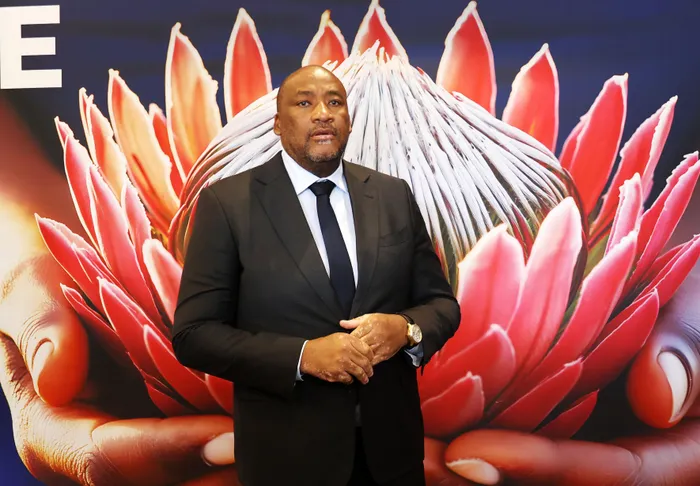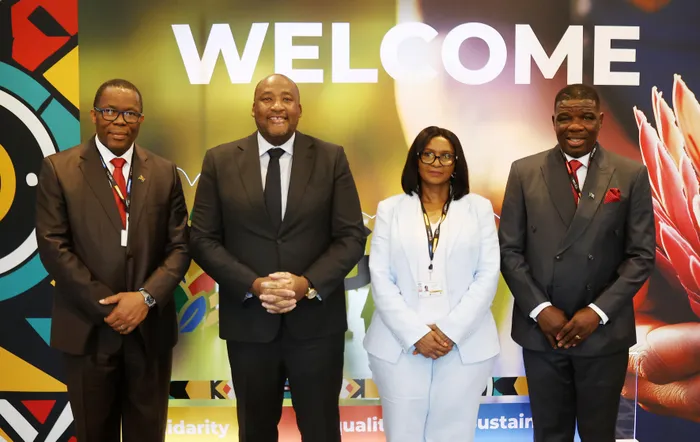
Embracing the spirit of Nelson Mandela: Gayton McKenzie calls for peace and collaboration at the G20 Culture Working Group.
Image: Tumi Pakkies/ Independent Newspapers
Sport, Arts and Culture Minister Gayton McKenzie drew on lessons from former president Nelson Mandela at the 4th G20 Culture Working Group (CWG) Ministerial Session in Zimbali on Monday.
This platform will consolidate outcomes and recommendations, will build on prior engagements and further advance discussions on four key priorities.
These are safeguarding and restitution of cultural heritage to protect human rights; integrating cultural policies into socio-economic strategies for inclusive, rights-based development; harnessing digital technologies for the protection and promotion of culture and sustainable economies; and exploring the intersection of culture and climate change in shaping global responses.
McKenzie said when Nelson Mandela was released in 1990, he said: “Peace is our only path. Holding hands is our only path.”
“Time showed that nothing trumps peace. No matter how difficult, we must always search for peace,” McKenzie said.
He said the delegates had to find solutions that would ultimately lead to peace.
“Your contribution here does not mean you have to agree with everything that we propose. That’s a dictatorship,” McKenzie said.
“We want a contestation of ideas and an idea that might not matter today (but) might dominate the discussion tomorrow.”

eThekwini Municipality Mayor Cyril Xaba, Sport, Arts and Culture Minister Gayton McKenzie, Free State Sport, Arts and Culture MEC Ntombizanele Beauty Sifuba and KZN Sports, Arts and Culture MEC Mntomuhle Khawula during the 4th G20 Culture Working Group Ministerial session in Zimbali.
Image: Tumi Pakkies/ Independent Newspapers
McKenzie highlighted South Africa’s world leading rugby, citing another Mandela lesson.
“The Springboks are feared and respected all over the world. We have won back-to-back world cups,” McKenzie said.
He said the name of the Springboks is an integral part of their success.
“The majority of us black people hated that name. We despised that name. We associated the name with apartheid,” McKenzie said.
“When democracy arrived, we said, ‘It is time for us to get rid of this emblem and of this name’. We were gonna get rid of the name and the emblem.”
Mandela, however, disagreed, insisting that the Springbok emblem and name would remain.
“We were furious. We were angry with the great Nelson Mandela. He said, ‘You might not see it today, but in years to come, you will understand the importance of compromise’,” McKenzie said.
“It is 33 years after he said those words. Today, no sport unifies our country like the Springbok brand. No brand unifies our country like the Springbok emblem... Nothing does more for social cohesion than this very same emblem and brand that we wanted to get rid of.”
McKenzie shared that story to highlight that even if delegates do not immediately appreciate each other’s ideas, it does not diminish their inherent value or future potential.
Speaking on the sidelines, McKenzie said he drew on Mandela’s lessons. He explained that every country would want to promote its own agenda, and there was nothing wrong with this, as nations naturally prioritise their own interests.
“I wanted them to understand that we must hear each other. You know, we’re hearing each other, and we must not talk past each other,” McKenzie said.
“I wanted to inculcate the spirit of Nelson Mandela, because I think all of them, all of us, must find a Mandela in us when we deal with other people.”
thobeka.ngema@inl.co.za